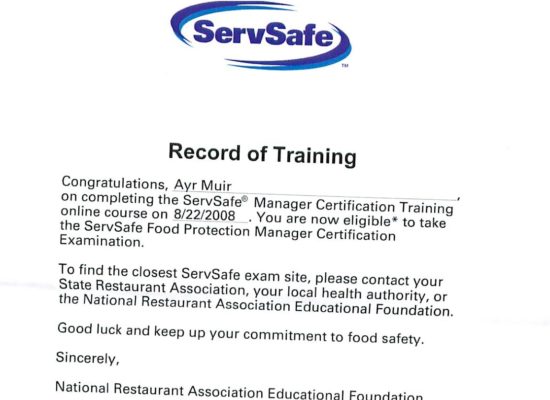
Last Friday I went into the Massachusetts Restaurant Association offices in Southborough, MA and took my ServSafe exam ($50). This is an exam that is required for “Foodservice Managers.” At John Olinto’s recommendation I’d skipped the course and opted for the online training. You sign up with the National Restaurant Association, give them $135, and take the course at your own pace online. It’s sort of fun and hokey, but they have all of these movies, and you have to let each of them play through, or manually fast forward before you can move on. Takes a long time, but you have to complete the training before you can take the test. It took me about 5 hours, and I don’t think it could go much faster for anyone. I managed to catch up on episodes of Mad Men while taking the course, so it wasn’t so bad.
So I needed an 75% to pass the test (which seems a pretty tough bar to me). I got a 88%, so home-free. I missed a couple about some meat-borne bacteria (they have about 15 that they want you to remember, all with different names), and a question about how to properly thaw a turkey.
The interesting thing is that the test and the FDA’s guidelines and requirements work together to ruin food quality. There is literally a quote suggesting restaurants consider using only frozen chicken because it is safer. Another one of my favorites: “consider using pasteurized eggs for all dishes that will not be cooked to high temperature.” (I’m paraphrasing) Pasteurized eggs!?! Do you know what those are? They come in a milk carton, enough said.
So here’s the interesting thing. Immune systems, nutrients, etc. aside, if you just take it that processed food has a lower incident of health problems (which it generally probably does). That only balances very broad distribution. That is, given the structure of these food systems and how many people are served out of a single factory, the cost of a failure is thousands sick.
FDA’s “potentially hazardous foods” (they recently changed that to some sort of acronym, TCS Food or something):
- Milk and milk products
- Eggs (except those treated to eliminate Salmonella spp.)
- Raw sprouts and sprout seeds
- Shellfish and crustaceans
- Heat-treated plant food, such as
- cooked rice, beans, and vegetables
- Fish
- Poultry
- Baked potatoes
- Tofu or other soy-protein food
- Sliced melons
- Untreated garlic-and-oil mixtures
- Synthetic ingredients, such as textured soy protein in meat alternatives
The latest addition to the list? Tomatoes. And they weren’t even to blame for the outbreak!